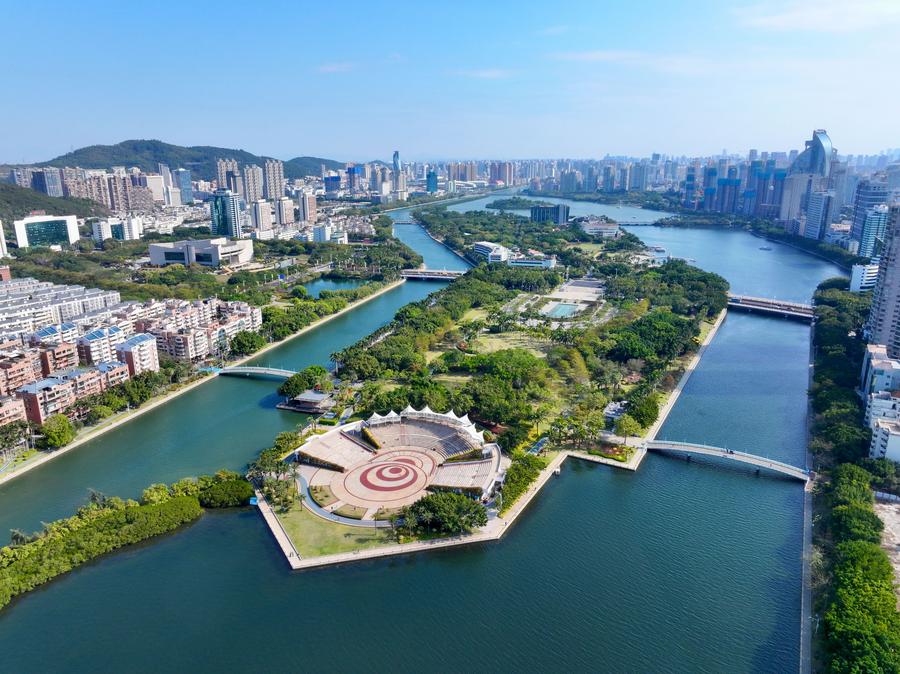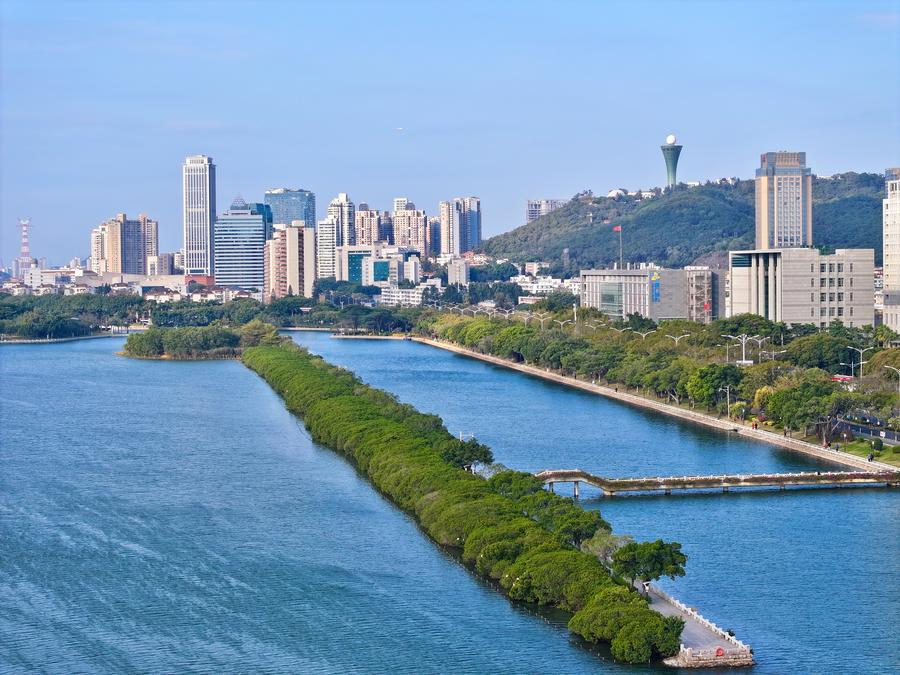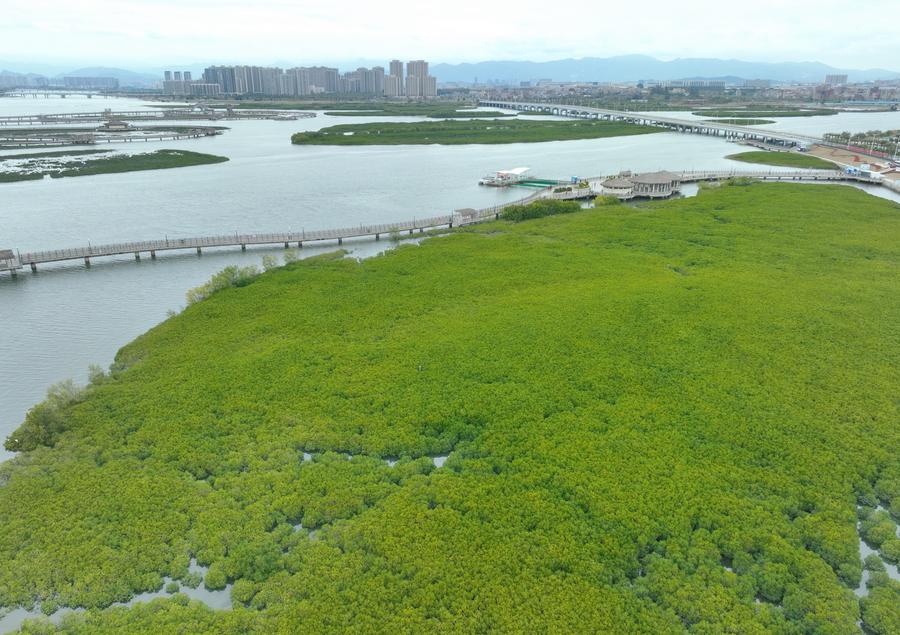How China's eco-transformation is inspiring the world

An aerial drone photo taken on Jan. 24, 2024 shows a view of the Bailuzhou Park beside the Yundang Lake in Xiamen, southeast China's Fujian Province. [Xinhua/Jiang Kehong]
The restored mangroves at Xiamen's Yundang Lake, an example of China's eco-transformation, are inspiring green development across the globe.
XIAMEN, China -- Having lived in Xiamen, a city in southeast China's Fujian Province, for over 30 years, U.S. professor William Brown often marvels at its change.
A regular walker around Xiamen's Yundang Lake, Brown recalls that in 1988, when he moved from the United States to Xiamen with his wife and two sons out of interest in the Chinese mainland, the lake was choked with sewage, smelly, and lifeless.
Today, the lake is a haven of clear waters, lush greenery, and thriving egrets. It is "proof that growing and greening can be sustainably balanced," Brown said.
"I hope more cities, in China and abroad, will learn from China's history and from Xiamen's example," added the scholar, who works at Xiamen University.
His sentiment resonates with United Nations (UN) ocean envoy Peter Thomson, who, during his visits to Xiamen, was struck by the extensive restored mangroves in a wetland park and the city's plans for integrating the park with ecotourism.
Xiamen's transformation owes much to Chinese President Xi Jinping, who came to Xiamen as its executive vice mayor in 1985. Nearly four decades later, the experience still carries implications for green development in China and beyond.

An aerial drone photo taken on Jan. 24, 2024 shows the mangrove forest beside the Yundang Lake in Xiamen, southeast China's Fujian Province. [Xinhua/Jiang Kehong]
XIAMEN EXPERIENCE
In the 1980s, Yundang Lake was heavily polluted due to industrial and domestic sewage discharge. Brown remembers the lake's stench. It was so bad "that I clasped a damp rag over my nose whenever I cycled past," he said.
At a time of rapid urbanization and industrialization, Xi, after some research, emphasized that development should never come at the cost of the environment. On March 30, 1988, Xi chaired a special meeting on cleaning up Yundang Lake. Xiamen established a leadership group overseeing the task and allocated 10 million yuan (about 1.39 million U.S. dollars) annually from the city's budget for two years.
Measures included shutting down and relocating industrial enterprises around the lake, building sewage plants, and channelling seawater into the lake to revitalize it. In 1992, a dragon boat race was held on Yundang Lake, symbolizing the success of its transformation.
"I could have never imagined that by 1992, Yundang Lake would have a dragon boat race, and in 1994 its clean-up program would become a UN Development Program demonstration site," said Brown.
Since then, Xiamen has expanded its ecological restoration efforts. During his posting in Xiamen, Xi spearheaded a 15-year development plan for the city, a section of which was dedicated to addressing environmental issues, with a sound ecology established as a strategic goal for Xiamen.
Over the past 36 years, Xiamen has invested 105.6 billion yuan (about 14.58 billion dollars) in marine ecological protection and restoration, aiming to construct a bay city where humans and nature coexist harmoniously.
Brown, a witness to the transformation, represented Xiamen in Stuttgart, Germany, in 2002, where Xiamen won the title of International Garden City. He told the judges that in the 14 years since he arrived, he had seen Xiamen transform into one of the most livable cities in the world.
Xiamen has also inspired other cities. Since 2005, World Ocean Week in Xiamen has been held with support from the UN Development Program and other organizations, gathering guests from more than 130 countries and regions and over 50 international organizations.
In a keynote speech during the 2023 World Ocean Week, Thomson highlighted Xiamen's experience in protecting mangroves, saying he had mentioned the example many times in speeches around the world.

An aerial drone photo taken on Jan. 23, 2024 shows a park of Mangroves in Xiang'an District of Xiamen, southeast China's Fujian Province. [Xinhua/Lin Shanchuan]
MANGROVE REVIVAL, MARINE GOVERNANCE
As an official in ocean affairs hailing from Fiji, known for its mangrove coasts, Thomson understands the critical importance of mangroves for marine ecology.
Over 20 percent of the world's mangroves are estimated to have been lost over the past 40 years, the Food and Agriculture Organization of the United Nations said in a report last year. China is one of the few countries with a net increase in mangrove areas, now totaling 29,200 hectares.
During his first visit to the Xiatanwei Coastal Wetland Park of Xiamen, Thomson was surprised to see vast plantings of mangrove saplings underway.
The nearly 85-hectare expanse of mangroves had been decimated by unchecked land reclamation and disorderly aquaculture. In 2005, Xiamen commissioned a research team from Xiamen University to plant experimental forests in Xiatanwei. After more than a decade of efforts, the mangroves finally revived.
Thomson was thrilled when he returned to Xiamen in 2023 to see the park in its "full and flourishing form."
"It is very rewarding for me to observe Xiamen working hard to fulfill its coastal responsibilities in a nature-positive way," the envoy said, adding that this may inspire waterfront cities and coastal communities worldwide.
Leticia Carvalho, who heads the UN Environment Programme's marine and freshwater branch, made similar remarks. Carvalho told Xinhua that China has prioritized marine ecosystem health, critical to the overall stability of oceans that provide a range of benefits, from oxygen to food, jobs, and recreation.
For instance, China's Blue Circle, a marine initiative developed by the Department of Ecology and Environment of Zhejiang Province and Zhejiang Lanjing Technology Co., Ltd, has collected over 10,700 tons of marine debris, she noted.
Selcuk Colakoglu, director of the Ankara-based Turkish Center for Asia-Pacific Studies, said China's efforts in constructing a marine ecological civilization have gained widespread acceptance and serve as a guiding principle for other developing countries.

This aerial photo taken on Aug. 20, 2022 shows Saihanba National Forest Park in Chengde City, north China's Hebei Province. [Photo by Liu Mancang/Xinhua]
CHINA'S ROLE IN GLOBAL GREEN PATH
In a time of rising temperatures and melting icebergs, China continues to call for global action and is keen to participate.
Colakoglu noted China's active participation in the United Nations' environmental activities, in the Paris Climate Agreement, and in related climate events organized by the G20 and other international organizations. Chinese participation will "encourage other developing countries in the Global South to follow sustainable development goals," he said.
On Jan. 18, 2017, Xi delivered a keynote speech at the UN Office at Geneva titled "Work Together to Build a Community of Shared Future for Mankind," calling for global efforts to maintain harmony between man and nature and pursue sustainable development.
Thomson, then president of the 71st session of the UN General Assembly, said he was "very inspired by President Xi Jinping's call for an 'ecological civilization' and the need for unity between humans and nature."
Erik Solheim, former under-secretary-general of the United Nations and executive director of the UN Environment Programme, shares this feeling. "Now China has become the one indispensable nation for global green development," he said in a recent interview with Xinhua.
Noting that China accounts for a large part of the world's green technologies, such as solar, wind and hydropower, and electric batteries and buses, Solheim said "it's extremely difficult and costly to try to go green without China."
In terms of nature conservation, China is the biggest tree planter, has achieved great success in protecting vulnerable species such as the giant panda, Tibetan antelope, and snow leopard, and China will soon host the largest national park network in the world, he said.
Solheim was particularly impressed by "the extraordinary miracle" of Saihanba in northern China's Hebei Province. In 2017, the Saihanba afforestation project won the UN Champions of the Earth Award for transforming degraded land into a lush paradise covering about 93,000 hectares.
It was Solheim who in Nairobi personally presented the trophy of the UN's highest environmental honor to representatives from Saihanba. "There are so many similar stories from China," he said.
For himself, one of the latest can be seen in Beijing. Ten years ago, when the air was polluted and the sky gray in the capital, Solheim would never go running. "This winter, I have happily done it three times. The sky was blue every time, the sun bright and I could inhale any amount of fresh, clean air. Taking action simply helps," he said.
"The world should partner with China. There is so much to learn," said Solheim.
























